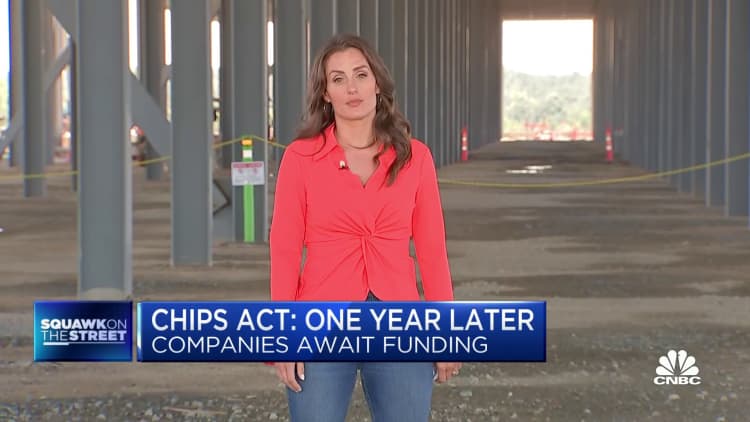
A year after President Joe Biden signed the CHIPS and Science Act into law, the U.S. semiconductor industry is still waiting on the windfall.
"We will start to give out the money later this year," said Secretary of Commerce Gina Raimondo. "We're pushing the team to go fast, but even more important, to get it right."
The goal of the $52.7 billion package was to reshore the semiconductor supply chain in America and in turn, improve national security by decreasing reliance on foreign countries. The law also prohibits funding recipients from expanding semiconductor manufacturing in China or other countries deemed a national security risk by the United States government.
The federal subsidies are meant to help offset the higher cost of building these manufacturing hubs, but so far, no funding set aside by the legislation has been awarded.
Raimondo said the Department of Commerce has received "over 460 statements of interest from companies around the world" hoping to be awarded federal funding for their projects. That's an increase from the agency's last update, which had that figure at "nearly 400."
The potential for federal funding has spurred some potential huge investments in the semiconductor sector. In total, $231 billion has been announced in private sector semiconductor investments in the United States, according to the White House. But many of those projects are contingent on receiving federal government aid.
Integra Technologies, for example, which provides semiconductor packaging and other services, plans to build a 1 million-square-foot facility in the Wichita, Kansas, area, provided it can receive the federal funding.
"The back-end semiconductor manufacturing sector that Integra participates in, operates on very thin margins that just don't make it possible without the CHIPS Act support to do this," Integra CEO Brett Robinson said.
The project would create nearly 2,000 direct, high-paying jobs.
"Once it's up and running and operational, the company can sustain the business with no further government support," Robinson said. "it's just that extreme amount of cost and time that it takes to get the facility built," that requires government help.
SkyWater Technology, a pure-play technology foundry, is already working with coalitions to find construction workers before breaking ground on its planned $1.8 billion plant in West Lafayette, Indiana.
The company expects to hire 700 new employees, but remains in the planning stage, unable to break ground until it knows if the project would receive federal funding, and how much.
"Once funding does start flowing, we can begin to start that process as quickly as possible," said CEO Tom Sonderman. "In terms of industry speed, maybe it's not as fast as we'd like, but in terms of the government really stepping up and preparing for what's coming, I've been impressed."
The Department of Commerce has hired 140 staff members tasked with evaluating CHIPS Act applications, and officials are in active talks with many of the potential recipients, according to a senior department official.
As companies await the federal dollars, many larger semiconductor firms have opened their coffers to begin expansion. Intel, Taiwan Semiconductor Manufacturing Co. and silicon carbide producer Wolfspeed have all hired workers and started construction despite not receiving any federal CHIPS Act funding.
When asked if the largest chip contractor in the world even needed government funding, TSMC Arizona President Brian Harrison said, "It's needed, and it will be used for the construction and the facilitation and outfitting with the equipment of these two factories."
Despite the marketing campaigns, presidential visits and public announcements promising billions of dollars in chips investments, not all applicants should expect to receive aid.
"We're going to have a bunch of tough choices ahead in terms of how we allocate our capital," said a senior Commerce Department official. "There's definite expectations that not every applicant is going to be happy. Some will be disappointed."


